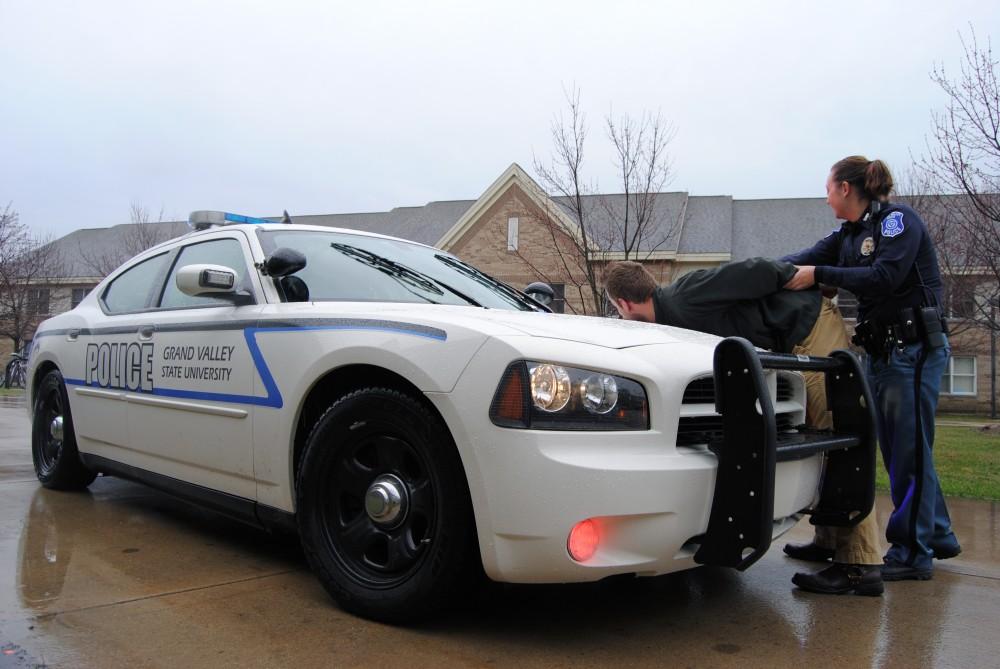DPS reports substance abuse as No. 1 factor in probation violations

Student’s on campus often have trouble getting off probation, due to the fact that they often violate the terms and the probation is extended.
Apr 7, 2011
At Grand Valley State University, 121 students are currently on probation, including some who are out on conditional bond. According to the Department of Public Safety, the most common reason for probation is drug or alcohol offenses.
After the initial citation or arrest, a court hearing is held to determine further disciplinary action. Penalties range from fines to probation to jail time, depending on the severity of the crime and whether or not the accused is a repeat offender. For alcohol or drug-related offenses, probation sentencing often includes mandatory preliminary breath tests (PBTs) or drug testing.
“Whether it’s in this county or another, a judge often identifies that a student needs to take a daily PBT,” said Capt. Brandon DeHaan, assistant director of Public Safety. “So in that case we provide the service to them free of charge. I’ve heard of other police departments charging anywhere from $3 to up to $20 per test.”
To meet the conditions of their probation, students must report to the DPS offices at a pre-determined time each morning to undergo testing. If they are late, fail to show up or test positive for illegal substances, DPS contacts the student’s probation officer. It is then up to the probation officer whether jail time will be enforced or if a court hearing will be scheduled.
In addition to mandatory testing, DPS and Ottawa County Sheriff officers often conduct specified checks on individuals who are on probation, including students who live off-campus. Since August 2010, DPS has recorded 31 probation violations.
“Probation is not a right, it’s a privilege,” DeHaan said. “With that, there are certain stipulations. The most common cause for students violating probation is use of alcohol or other narcotics.”
Recent GVSU graduate Garrett Pelican is one of many students who make it through the probation system each year. Pelican was a passenger in a friend’s car when an officer pulled them over for failure to maintain a lane and flicking what the officer thought was a joint out of the car window. Once pulled over, the friend admitted the pair had been smoking marijuana.
Although initially charged with possession of marijuana, Pelican’s lawyer was able to get his charge reduced to marijuana use. However, Pelican still received 12 months probation through the 52nd District Court in Hudsonville, Mich.
“Initially, probation was frustratingly restrictive,” Pelican said. “All marijuana-related charges demand that the defendant have his driver’s license suspended for a minimum of six months. Losing my license was the most annoying aspect of the process if only because I wasn’t cited for any vehicular charge.”
Beyond the license suspension, probation prohibits the use of controlled substances – alcohol and their substitutes. Although Pelican was of legal drinking age, he could not consume alcohol while on probation. He underwent monthly testing for illicit substances in addition to meeting with his probation officer, who could also order random drug tests with a few days’ notice.
“At our first meeting, my probation officer and I were not friendly,” Pelican said. “With every meeting after, it was more casual and conversational.”
Overall, Pelican said he did not find the probation process to be too overwhelming.
“I believe marijuana should be decriminalized and regulated,” he said. “That said, it is not presently legal, so my punishment was fair. Our law enforcement should place more emphasis on meting out punishments and justice to felons and dangerous criminals rather than college kids with misdemeanors, but that’s a debate for another time.”
Pelican added that he viewed probation as a learning experience and completed his probation by simply committing to the system.
“The best advice once you’re in a hole is to stop digging,” he said. “Analogies aside, if you’re on probation, do not violate. It is possible to fool the system and the tests, but craftier individuals than you have failed. Do your time, stay out of trouble and use the experience as one for learning.”





















